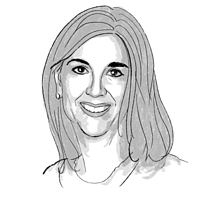Food, clothing, shelter, and ... books
When you think about the basic needs of Ukrainian refugee children, books would seem to occupy a place much farther down the list than food, clothing, and shelter. But for Maria Deskur, CEO of Poland’s Universal Reading Foundation, the idea of giving books to children is nearly as urgent.
“The help for kids here is crucial,” Ms. Deskur explains in a video chat from Warsaw, Poland. “Reading to a child creates a sense of safety, the feeling that ‘If we have time to read a book, that means we are OK,’” she says.
The foundation aims to get as many Ukrainian-language books into the hands of refugees as possible. As of mid-April, the group had distributed 50,000 books: 30,000 printed by Polish publishers and 20,000 transported out of Ukraine. Ms. Deskur would love to see the overall number of books given out to Ukrainians increase to 200,000 or even 500,000, including those for teens and adults. The Universal Reading Foundation has so far raised $170,000 toward its goal.
It’s important for the children’s books, especially, to be in Ukrainian because “sharing a book with their parent, in their mother tongue, helps build moments of emotional stability,” Ms. Deskur says. She explains that the refugees, who have come largely from eastern Ukraine, do not know Polish. The languages are quite different, with Ukrainian using Cyrillic script and Polish using the Latin alphabet.
Ms. Deskur also wanted to help Ukraine’s book industry survive. When Russia invaded, she reached out to dozens of publishers, and was eventually able to get books shipped from warehouses all over Ukraine to the western city of Lviv, not far from the Polish border. “They were writing to me, and it’s not only that their books will be read, but the fact that someone is interested in their fate ... and they’re not left alone,” Ms. Deskur says. The first shipment finally arrived in Poland on April 7. She adds, “I don’t know how long this will be possible” to get shipments across the border.
The Universal Reading Foundation, whose purpose is to increase literacy in Poland, has another motive behind its efforts – encouraging reading as a civic good. At the end of World War II, Poland’s libraries and publishing industry lay in ruins. In the decades since, literacy rates have remained stubbornly low, “below that of all our neighbors except Russia,” she says.
“After 70 years, we are still behind the other societies where that didn’t happen,” Ms. Deskur says. “We have to help Ukraine so this doesn’t happen there.”
The challenge is vast. One million Ukrainian children have arrived in Poland, and more are coming every day. The consequences of low literacy rates “are terrible. A society that reads is more open,” Ms. Deskur says. “It’s a society that can enter into a dialogue and understand each other better.”







